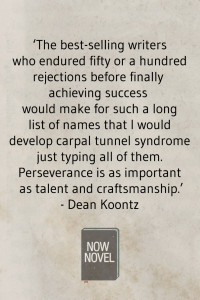Writing a novel requires that you pay attention to the many elements of a book that factor into whether or not it is an excellent read. Great writing advice will help you to finish and take further steps to publication when your book is complete. Read advice from seven bestselling authors on how to write a book:
Always put the story first
Writing a novel most often involves a fair amount of research. Think of John Grisham’s legal thrillers, for example. Specialist knowledge of legal procedure is not something every author possesses. Many story ideas will require thorough research if you want to keep readers spellbound with the authenticity of your imaginary world. Even so, make sure that details harvested in your research process do not overwhelm your story.
In his book On Writing, Stephen King cautions against relying too heavily on your research to flesh out your novel: ‘You may be entranced with what you’re learning about flesh-eating bacteria, the sewer system of New York, or the IQ potential of Collie pups, but your readers are probably going to care a lot more about your characters and your story.’
Make sure you have a plan for your novel to guide you
Have you ever felt that a book could have used a good edit or felt like the author wandered from scene to scene without any satisfying connecting thread? This often results of not having a clear enough idea of what your book is trying to say or how you intend to say it. There should, of course, be a degree of freedom in writing a book, as you let the characters and situations you invent play out their own inner logic. Yet having a form of blueprint for your novel will help you make sure that each part plays an integral part in completing the whole.
Nicholas Sparks, bestselling writer of the 1996 novel The Notebook (made into a successful film by Nick Cassavetes), offers this novel-writing advice:
‘Everything that I need to know about the novel could be put down in, oh, a page and a half of bullet-points. That includes the beginning, the end, the major turning points, a little bit about the characters, time frame, setting, voice, length, some secondary characters. Once I have that, I let the rest of the story fill itself in from there.’
Let real people inspire your cast of characters
Besides working out the mechanics of plot or narrative event, it’s important to create characters that move, amuse, surprise, shock, frighten or charm your readers (depending on your genre and the message or effect you want to convey in any given scene or overarching story). Some aspiring writers are nervous of using real people in fiction for fear of negative reprisals, but you do not have to copy a person’s entire life story verbatim: drop in a detail or quirk here or there to create distinctive characters.
Thanks to the success of his fantasy trilogy The Lord of the Rings (in both in book form and as Peter Jackson’s screen adaptations), J.R.R. Tolkien is one of the best-known fantasy authors of all time. A passage from Tolkien’s personal writing suggests how to create novel characters that feel alive: ‘There was a curious local character, an old man who used to go about sweeping gossip and weather-wisdom and such like. To amuse my boys I named him Gaffer Gamgee, and the name became part of family lore to fix on old chaps of the kind. At that time I was beginning on The Hobbit.’
(As an aside, read how Tolkien incorporated poetry in his novels.)
Always persevere and take criticism in your stride
 Suspense/thriller writer Dean Koontz has had fourteen of his paperback novels reach the number one position on the New York Times’ bestseller list. In a guest author interview published to promote his novel Odd Apocalypse, Koontz shares 7 of his top tips for writing a bestseller. Says Koontz, ‘The best-selling writers who endured fifty or a hundred rejections before finally achieving success would make for such a long list of names that I would develop carpal tunnel syndrome just typing all of them. Perseverance is as important as talent and craftsmanship.’
Suspense/thriller writer Dean Koontz has had fourteen of his paperback novels reach the number one position on the New York Times’ bestseller list. In a guest author interview published to promote his novel Odd Apocalypse, Koontz shares 7 of his top tips for writing a bestseller. Says Koontz, ‘The best-selling writers who endured fifty or a hundred rejections before finally achieving success would make for such a long list of names that I would develop carpal tunnel syndrome just typing all of them. Perseverance is as important as talent and craftsmanship.’
Read, read and read some more
It shouldn’t need saying that many of the best writers are equally passionate readers. As the international bestselling YA fantasy (and, more recently, thriller and realist fiction) writer J.K. Rowling says, ‘I always advise children who ask me for tips on being a writer to read as much as they possibly can. Jane Austen gave a young friend the same advice, so I’m in good company there.’
Just get to the end
It may be stating the obvious, but your book won’t be a bestseller if you never finish writing it. Many aspiring writers imagine a process that is smooth and consistently enjoyable. Bestselling author Sophie Kinsella has some important advice for staying motivated to finish writing a novel:
‘Everybody, no matter who they are gets to the middle of a book and thinks crikey, I’ve had enough of this. You get bored with your story and your characters, you hate them all, you can’t think why you started this wretched story in the first place.
The truth is, every book is hard to write, everybody reaches a wall, whether it is a plot hole or a scene that you can’t get past. So you’ve just got to get to the end. Even if it’s not the greatest draft, if it needs rewriting fine, at least you have a book to rewrite.’
After you finish writing your novel: Publishing advice from Margaret Atwood
 Margaret Atwood is one of Canada’s finest authors. Her literary and speculative fiction has won her over 55 national and international awards, including the prestigious Arthur C. Clarke and Booker awards. Yet every writer starts somewhere. When you finish writing a novel, the search for the perfect publisher begins (unless you intend to self-publish, in which case you will need a different toolkit).
Margaret Atwood is one of Canada’s finest authors. Her literary and speculative fiction has won her over 55 national and international awards, including the prestigious Arthur C. Clarke and Booker awards. Yet every writer starts somewhere. When you finish writing a novel, the search for the perfect publisher begins (unless you intend to self-publish, in which case you will need a different toolkit).
Atwood offers some advice on finding a publisher:
‘Be aware of smaller publishers, should the bigger ones not see the glory of your ways. They may want and need you. Go with the one who loves you, not the one with the biggest gold buttons. Some writers self-publish successfully. Many don’t. Take advice. You will find a lot of good practical tips (and swear words) on www.terribleminds.com‘
Sound advice can help you finish your novel, but feedback from other writers is even more valuable. Find a writing group for mutual critique.


9 replies on “Writing a novel: 7 tips from bestselling authors”
Excellent article. Thanks!
My pleasure, Lexa. Glad you found it useful!
Sound advice. I have this plot in my head, and have9000 words. A year ago. Stuck. Everyone who read it says it has great potential. Anyone? It is a modern and female Harry P.
I was stuck for 2 years because of what I thought was a lack of research… But turned out to be a lack of confidence and just a need of maturing the story. Stephen King… always so damn right !
When you need to create the novel but you do not even how to start you can find already created novels and rewrite it with your own words. There is a special rewriting a novel service https://www.rewritingservices.org/rewriting-a-novel-how-to-make-it-easy/?utm_source=dc that can help you with your writing issue and you will get the ability to receive the unique novel that will meet all requirements. If their writers will work with your paper you can be sure that it will be free of grammar, spelling and syntax errors and you will get the chance to impress your readers with an amazing content.
This is really great advice! Thank you so much! 🙂
It’s a pleasure, Lily. Thank you for reading our articles!
Thank you for sharing. I found the tips very useful.
I’m glad to hear that, Mark. Thank you for reading our articles and sharing your feedback.